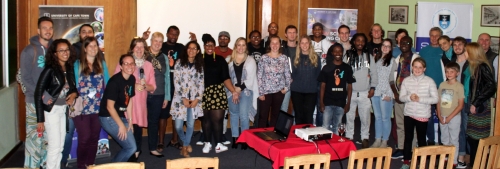Pint of Science at UCT
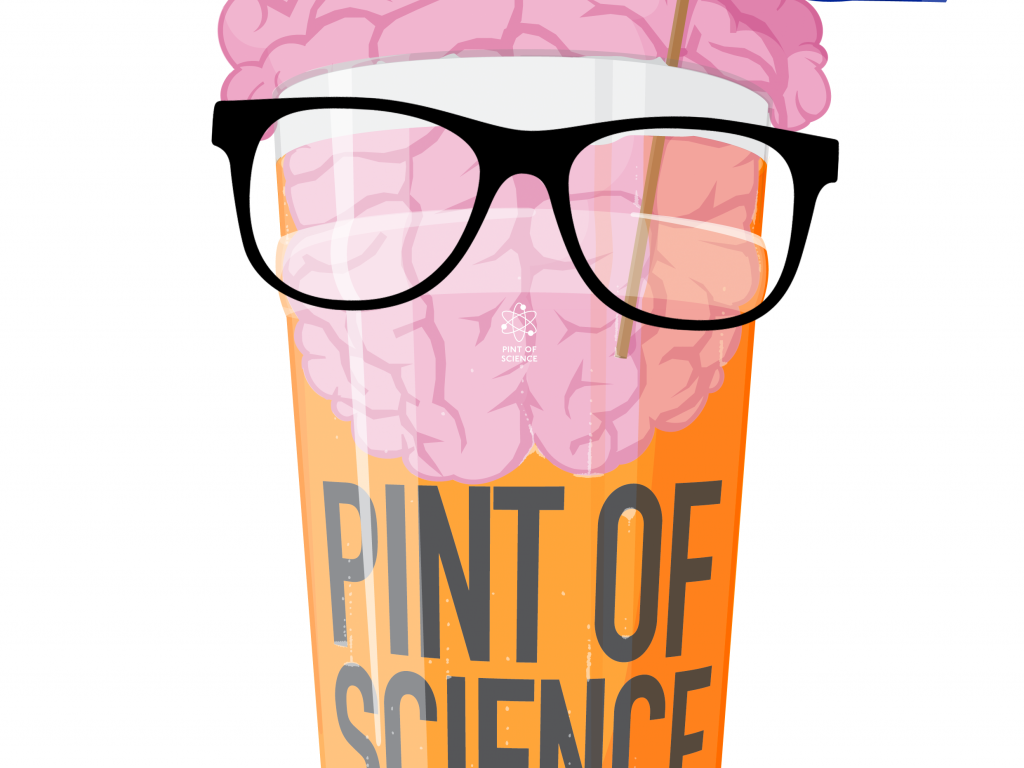
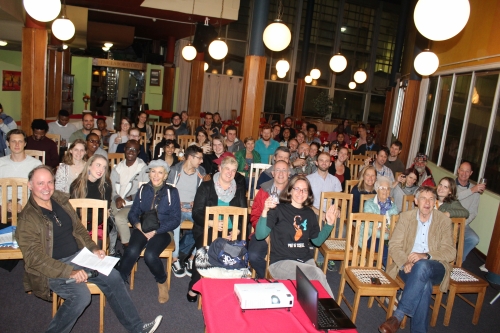
Eager pint of Science enthusiasts in the UCT Club
The UCT Club was abuzz on Monday, Tuesday and Wednesday evening as UCT Postgraduate students and staff presented their research and engaged with the public and students, highlighting their discoveries and developments.
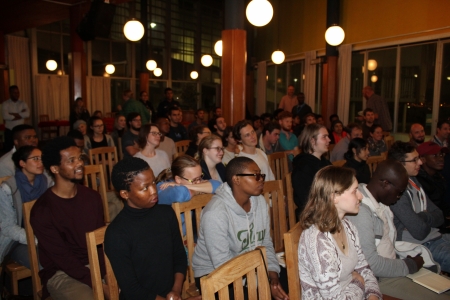
The audience was provided with a whistle-stop tour of a range of topics, from neurons, atoms and galaxies, to phytoplankton that is saving the earth, to birds that weigh themselves on UCT campus, to the pros and cons of carbohydrates; the impact of dust emissions; to toxins in maize; to how increased DNA changes the way plants use water; the effects of mindset on academic achievement and how plants can take on viruses....
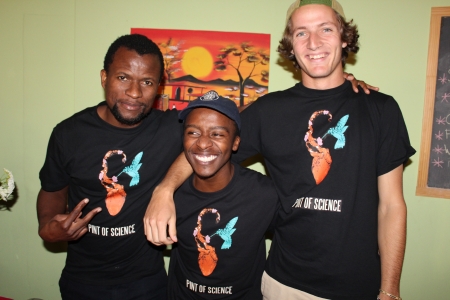
Volunteers assisting in the running of Pint of Science
The talks were highly informative, as well as being entertaining and the speakers used humour and everyday examples that people could relate to, to create understanding of complex issues.
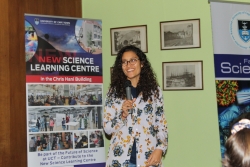
Naadirah
Naadirah Moola kicked off the series with a talk entitled, "A maze within maize", where she uncovered how maize, a staple food in South African diets, hides a toxic secret - toxins associated with adverse health effects in humans and animals. Her talk looked at the role of plant defence nad biopesticide in managing the complex interaction.
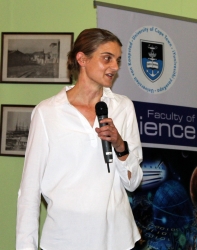
Jore
Jore von Holdt, currently doing a Post doc in the Department of Chemical Engineering, presented the topic "Is dust really that big?" She discussed aeolian dust emissions and her current research involving mine dust and how it affects people and the environment. Her satellite images presented showed powerful evidence of the impact of industrial mining outputs producing dust and impacting climate.

Kolisa with Associate Professor Isabelle Ansorge, MC for the evening
Kolisa Sinyanya, a PhD candidate in the Department of Oceanography, talked on the topic of "Phytoplankton: the microscopic photosynthesizers that are saving our planet". In her talk she explained how the ocean absorbs about 93% of the carbon dioxide found in the atmosphere and that the microscopic phytoplankton communities are the major role players in the overall process of carbon drawdown. She reminded the audience that human activity is the larges contributor to the warming of the planet and encouraged us to watch our carbon footprints individually.
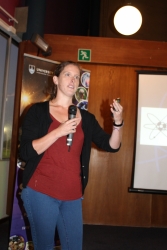
Tanya
Tanya Hutton, a postdoctoral fellow in the Department of Physics, working on applied nuclear physics had the topic "A neutron walks into a bar". Her talk introduced the audience to neutrons, the history of their discovery and their importance to the world we live in today. She explored how from atoms, to pubs, to power and galaxies, just how critical neutrons are to the universe.
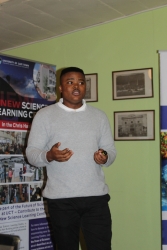
Mashudu
Mashudu Mokhithi, a lecturer in Mathematics & Applied Mathematics, spoke about "Is Intelligence Fixed or Malleable?" and examined the effects of mindset on academic achievement in Mathematics and showed how mindsets affect academic performance and can be changed.
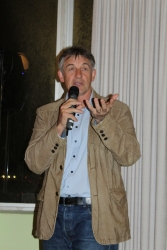
David
Associate Professor David Gammon gave a highly entertaining talk on the topic "Are all carbohydrates bad?" defined what carbohydrates are, challenged banting and the bad press that carbohydrates have received of late, showing that we owe our lives to their existence and he even spoke about 'de-colonization' in the colon. He explained that the reason the UCT Club had run out of Burgers and Chips was that because he was limiting the bad impact of carbohydrates on the audience!!
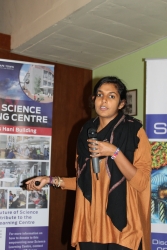
Jessleena
Jessleena Suri, a PhD student with a passion for birds and urban ecology, took the audience through "Ornithology in the city" and explained how birds are ideal indicator species for understanding how biodiversity responds to environmental change and are sensitive to habitat quality. She outlined some of the research taking place at UCT where birds are tagged and even weigh themselves on the scales set up by the researchers. Her talk showed how studying urban birds cope with living in highly disturbed environments, we can understand how species endure the massive transformation that occurs in urban areas and how we can better design our cities to accommodate wildlife.
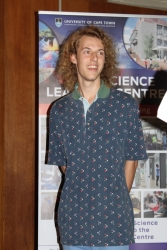
Ruan
Ruan van Mazijk, a passionate botanist spoke about "Does having more DNA change the way plants use water?" His talk explored how exploring genome size alters plant physiology in the Cape. He explained how he had found that large genomes in plant cells place lower limits on cell size and possibly changes their water-use, habitat preferences and ecology. His investigation into the Cape fynbos plant group indicates how strongly the genome-size-cell-size relationship has broader consequences for how these plants live and function in nature.
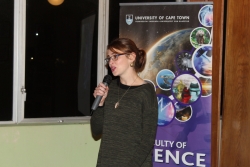
Inge
Inge Pietersen, a budding microbiologist/ biotechnologist/ virologist and molecular biologist talked about "The future is here and it is plantastic!" Inge started her talk by saying that should a zombie apocalypse occur, plants would be the saviours to come to our rescue! She talked about biopharming, the use of plants as production factories for important biological compounds and explained how at UCT they are hacking nature's amazing systems to produce vaccines against important viral pathogens, such as Human papillomavirus (HPV), HIV, Influenza and veterinary viruses. Inge highlighted how this cutting-edge research, combined with other new technologies such as vertical farming and nanoparticle drug-delivery systems may allow us to produce massive amounts of safe, specific and cheap vaccines and therapies here in Africa, for Africa.
The Pint of Science was well attended and the participants learned a great deal in this window into the world of Science.
The Faculty of Science acknowledges that is has a responsibility as a community of scientists, to engage with the public and inform them about our scientific discoveries and developments and it is hoped that this will become an annual event in the UCT calendar.
Our thanks to all of the speakers for preparing such interesting, informative and entertaining presentations and for engaging with the audience so wholeheartedly.
